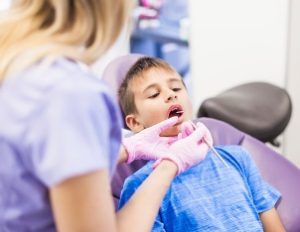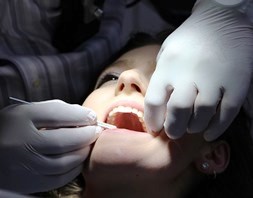Dental Hygiene Schools
How to Pick the Right One Near South Saint Paul Minnesota
 The most important first step to start your new career in preventive dentistry is to pick the ideal dental hygienist school near South Saint Paul MN. But prior to making your selection, you need to evaluate and compare your school options. Selecting the training with the lowest tuition or enrolling in the college that is closest to your home is not the ideal way to come to a decision. There are other crucial issues to take into account as well, such as the program's reputation and accreditation. A dental hygienist usually must spend anywhere from two to three years to complete an Associate Degree, as compared to a certificate typically earned by dental assistants in about a year. And therefore there is more expense associated with the prolonged training of a hygienist as compared to an assistant. We will cover all of these factors and supplemental questions that you need to be asking the dental hygienist colleges you are assessing later in this article. But first, let's look at the roles of dental hygienists and the training programs available.
The most important first step to start your new career in preventive dentistry is to pick the ideal dental hygienist school near South Saint Paul MN. But prior to making your selection, you need to evaluate and compare your school options. Selecting the training with the lowest tuition or enrolling in the college that is closest to your home is not the ideal way to come to a decision. There are other crucial issues to take into account as well, such as the program's reputation and accreditation. A dental hygienist usually must spend anywhere from two to three years to complete an Associate Degree, as compared to a certificate typically earned by dental assistants in about a year. And therefore there is more expense associated with the prolonged training of a hygienist as compared to an assistant. We will cover all of these factors and supplemental questions that you need to be asking the dental hygienist colleges you are assessing later in this article. But first, let's look at the roles of dental hygienists and the training programs available.
It Takes Just a Few Minutes to Start Your Dental Hygienist Career Below
Dental Hygienist Job Duties

When comparing the job of a dental hygienist to that of an assistant, the biggest difference is probably that the hygienist works more independently. Dental assistants work with and in support of the South Saint Paul MN practice and the dentists. Hygienists, while also assisting the practice, deal with the patients more on a one-to-one basis. They are usually the first person a patient sees when called from the waiting area. They examine each patient's teeth and gums and report their results to the dentists. They may also perform basic procedures. Depending on state law, a hygienist's responsibilities can include:
- Removing stains, tartar and plaque
- Administering fluoride treatments
- Applying sealants and polishing teeth
- Teaching patients about oral care
- Taking and developing X-rays
- Applying fillings and removing sutures
Dental Hygienist Education Options
As a result of the additional responsibility as compared to an assistant, dental hygienists employed in South Saint Paul MN dental practices are generally required to hold an Associate Degree in dental hygiene rather than a certificate. These programs can take anywhere from 2 to as long as 3 years to complete and must be accredited by the CDA in virtually every state. They are offered in community colleges as well as trade and technical schools. And in addition to classroom studies learning the fundamentals of dental hygiene, there will be a practical component to the training as well. A number of programs also offer internships with local dental practices or dentists.Online Dental Hygienist Classes
 Selecting an online dental hygienist program may be a good option for obtaining your education. Just remember that the classes will not be totally online, since there will be a clinical portion to your training. But the balance of your classes will be provided via your desktop computer in the comfort of your South Saint Paul MN home or elsewhere on your tablet or laptop. For those continuing to work while going to college, online dental classes make education far more obtainable. Many may even have lower tuition costs than their traditional competitors. And added expenses for items like commuting, books and school supplies may be reduced as well. The clinical training can typically be completed at an area dental office or in an on-campus lab. With both the clinical and online training, everything necessary to get the appropriate education is provided. If you have the dedication for this method of education, you may find that attending an dental hygienist online program is the best choice for you.
Selecting an online dental hygienist program may be a good option for obtaining your education. Just remember that the classes will not be totally online, since there will be a clinical portion to your training. But the balance of your classes will be provided via your desktop computer in the comfort of your South Saint Paul MN home or elsewhere on your tablet or laptop. For those continuing to work while going to college, online dental classes make education far more obtainable. Many may even have lower tuition costs than their traditional competitors. And added expenses for items like commuting, books and school supplies may be reduced as well. The clinical training can typically be completed at an area dental office or in an on-campus lab. With both the clinical and online training, everything necessary to get the appropriate education is provided. If you have the dedication for this method of education, you may find that attending an dental hygienist online program is the best choice for you.
What to Ask Dental Hygienist Programs
Now that you have decided to become a dental hygienist in South Saint Paul MN, you can begin the process of comparing programs and schools. As we discussed at the beginning of this article, a number of potential students begin by checking out the location and the cost of the schools. Possibly they search for several online alternatives also. Although these are significant initial considerations, there are a few additional questions that you need to address to the programs you are reviewing in order to arrive at an informed decision. Toward that end, we have provided a list of questions to help you with your due diligence and final selection of the right dental hygienist program for you.
Is the Dental Program Accredited? There are a number of valid reasons why you should only select an accredited dental hygienist college. If you are intending to become licensed or certified, then accreditation is a prerequisite in virtually all states. To qualify to take the National Board Dental Hygiene Exam, your dental program must be accredited by the Commission on Dental Accreditation (CDA). Accreditation also helps ensure that the instruction you receive is of the highest quality and comprehensive. South Saint Paul MN employers typically prefer or require that job applicants are graduates of accredited colleges. And finally, if you are applying for a student loan or financial aid, frequently they are not available for non-accredited programs.
Is Sufficient Clinical Training Provided? Clinical or practical training is an important component of every dental training program. This holds true for the online college options also. Many dental hygienist schools have relationships with regional dental offices and clinics that furnish clinical training for their students. It's not only imperative that the program you select provides sufficient clinical hours but also provides them in the kind of practice that you subsequently would like to work in. As an example, if you are interested in a career in pediatric dentistry, check that the program you select offers clinical rotation in a local South Saint Paul MN dental practice that focuses on dental care for children.
Is There an Internship Program? Ask if the dental programs you are considering sponsor internship programs. Internships are undoubtedly the ideal method to receive hands-on, clinical experience in a professional dental practice. They help students to transition from the theoretical to the practical. They can also help students form professional relationships in the South Saint Paul MN dentistry community. And they are attractive on resumes also.
Is Job Placement Assistance Offered? Most graduating students of dental hygienist programs require help obtaining their first job. Check if the colleges you are researching have job placement programs, and what their job placement rates are. Schools with high job placement rates probably have excellent reputations within the South Saint Paul MN dental profession in addition to extensive networks of contacts where they can place their students for employment or internships.
Are Classes Small? Ask the colleges you are evaluating how big on average their classrooms are. The smaller classes generally provide a more intimate setting for training where students have increased access to the teachers. Conversely, bigger classes can be impersonal and provide little individualized instruction. If feasible, ask if you can monitor a few classes at the South Saint Paul MN dental hygienist school that you are leaning toward so that you can experience first hand the amount of interaction between instructors and students before making a commitment.
What is the Total Expense of the Program? Dental hygiene programs can fluctuate in cost dependent on the duration of the program and the amount of clinical training provided. Other variables, for example the reputations of the colleges and whether they are public or private also come into play. But in addition to the tuition there are other significant costs which can add up. They can include costs for such things as textbooks and commuting as well as school equipment, materials and supplies. So when comparing the cost of programs, don't forget to add all of the costs related to your education. The majority of schools have financial aid departments, so be sure to check out what is offered as far as grants, loans and scholarships in the South Saint Paul MN area.
Are the Classes Accessible? Before selecting a dental hygienist college, you must make sure that the assistant or hygienist program provides classes that suit your schedule. This is especially true if you will be working while getting your education and must attend classes near South Saint Paul MN in the evenings or on weekends. And even if you choose an online program, you will still need to schedule your practical training classes. Also, while addressing your concerns, ask what the make-up procedure is if you should need to miss any classes because of illness, work or family issues.
Learn More About How to Become a Dental Hygienist in South Saint Paul
Choose the Best South Saint Paul Dental Hygienist Program
Selecting the ideal dental hygienist program is imperative if you want to take the National Board Dental Hygiene examination or, if mandated in your state, become licensed. As you now know, there are many options offered to receive your training and it takes a relatively short period of time to become a dental hygienist. You can acquire your formal education through dental hygienist programs at junior colleges, trade schools, vocational schools and technical institutes. Graduates of these programs typically receive an Associate Degree. Dental Hygienists normally require roughly 2 years of studies prior to entering the work force. When earning a degree you can elect to go to classes online or on-campus. Whichever mode of training you choose to pursue, by asking the questions provided in this article you will be better prepared to make the best choice. And by doing so, you will be ready to commence your journey toward becoming a dental hygienist in South Saint Paul Minnesota.
South Saint Paul Dental Hygienist Colleges | South Saint Paul Dental Hygienist Schools Near Me
